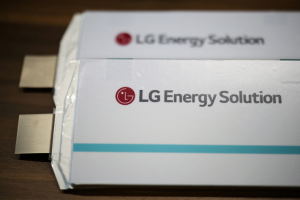South Korean electric vehicle (EV) battery giants Samsung, Hyundai and SK On announced plans on Tuesday to invest billions in setting up plants in the United States.
Samsung SDI announced it will invest at least $3 billion to build a joint venture EV battery plant with General Motors. Meanwhile, rival Hyundai said it had finalised a similar $5 billion JV with SK On to boost electrification efforts in its largest market.
The announcements came on the heels of South Korean President Yoon Suk Yeol’s visit to the US, along with 120 executives from some of the country’s biggest companies.
Also on AF: Korea Battery Makers, Seoul Join Forces in $15bn Power Alliance
Yoon is in Washington to meet President Joe Biden on the first state visit to the US by a South Korean leader in 12 years.
Dozens of business deals have been under discussion to be signed during Yoon’s visit, Choi Sang-mok, senior presidential secretary for economic affairs, told reporters last week.
Yoon, who calls himself “the No. 1 salesman” for South Korea, has made business deals and “sales diplomacy” a core element of his foreign trips.
US EV credits in sight
The moves also follow new US sourcing requirements for EV battery components and critical minerals in order for car buyers to qualify for up to $7,500 in credits under the Biden administration’s Inflation Reduction Act (IRA). Cars made by Hyundai and sister company Kia are currently not eligible for the tax credits.
Samsung SDI said it was aiming to make the plant operational from 2026, targeting an annual production capacity of 30 gigawatt hours (GWh). However, it has not yet decided the location of the planned JV plant, Samsung said.
Meanwhile, Hyundai and SK On will set up their EV battery plant in the state of Georgia, the companies said, formalising an earlier provisional agreement.
The plant is expected to start manufacturing battery cells in the second half of 2025 with an annual production capacity of 35 GWh — sufficient to support the production of 300,000 EVs.
Hyundai shares rise on earnings
Carmaker Hyundai also reported its first-quarter net profit had more than doubled, exceeding expectations. Its shares rose as much as 5% to a seven-month high after the announcements, and as the automaker also initiated steps to improve shareholder returns.
The company, which makes the Tuscon sport-utility vehicles (SUVs) and the Elantra sedans, reported a net profit of 3.3 trillion won ($2.47 billion) for the January-March period versus a profit of 1.6 trillion won a year earlier.
It attributed the profit jump to a rise in vehicle output as a global chip shortage eased and demand for its high-margin SUVs remained strong.
“On top of strong car demand, raw material costs have continued to stabilise and drop since late last year, helping Hyundai achieve better profitability,” said Lee Jae-il, an analyst at Eugene Investment & Securities.
Hyundai and Kia cars are competitive in the US, based on their prices and a favourable exchange rate, he added.
Seo Gang Hyun, head of Hyundai’s planning and finance division, said conventionally powered SUVs and luxury Genesis cars still accounted for a large proportion of the company’s US sales.
“So I would say that the impact of the Inflation Reduction Act would not be as substantial as you are concerned about,” he told analysts on an earnings call after being questioned about the issue.
- Reuters, with additional editing by Vishakha Saxena
Also read:
South Korea’s SK On to Produce Cheaper EV Battery by 2025
US, Japan Set to Sign Trade Deal on EV Battery Minerals
China’s CATL Eyes Condensed Matter Battery for Planes, EVs
China Leading the Way With Rechargeable Sodium Batteries – NYT
























